Through the years, it has been said that the most important meal of the day is breakfast. I love a good breakfast. Firstly, having a great breakfast will give a real kickstart for the day. Secondly, a breakfast made of good ingredients will keep you full for a long time. Therefore, I have been super happy to discover Tunisian breakfast. Especially because the traditional Tunisian breakfast dishes are very original and unique. Something that I have never seen anywhere else.
In this ultimate Tunisian breakfast guide, I present 5 everyday and 8 traditional Tunisian breakfast dishes. In addition, I also answer the question “What do Tunisians drink in the mornings?” So, let’s dive in!
Read also these posts:
8 Traditional Tunisian breakfast dishes
- Droo
- Bsissa
- Masfouf/Mesfouf
- Assida Bidha
- Mlawi
- Ftayer
- Khchef
- Chamia
Droo - Traditional Tunisian breakfast
Droo, known also as crème de sorgho is a very typical and traditional Tunisian breakfast. Droo is made of sorghum powder. The sorghum cereal grain is one of the most important cereal grains in the world, but not many people have heard about sorghum. Sorghum grains are gluten-free and very rich in nutrition, and also high in fiber and protein. For this reason, droo is a very popular dish among physical labor workers, and during Ramadan.
The droo is made of sorghum powder, that is boiled with water and sugar. After some time of boiling, the droo becomes firm pudding. One option is to season the pudding with flower water. The prepared pudding is decorated with peanuts and Chamia (sesame seed paste). The flavor of the droo is rather mild. But I must say that it’s a great breakfast! Eating one bowl of droo keeps me full for a long time.
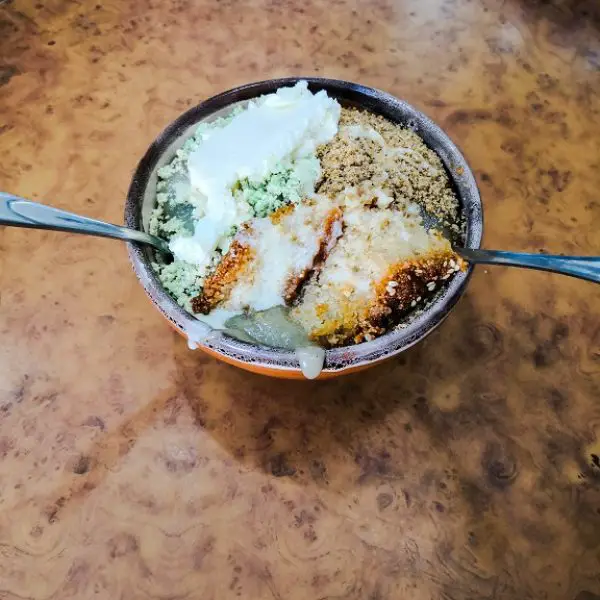
Bsissa
Bsissa is a very traditional Tunisian breakfast that has been consumed over the centuries. We can say that Bsissa is pure gold when it comes to nutritious richness. Bsissa is an energetic food that is made of a mix of cereals, roasted vegetables, and spices. That makes Bsissa rich in protein, slow sugar, fiber, minerals, calcium, and iron. The spices have an anti-inflammatory effect and helps also digestion.
So how do you make and consume Bsissa? There are two versions of bsissa: firm and drinkable one. Bsissa is a powder that is mixed with olive oil and sugar or honey. When you make Bsissa like this, it has quite a firm texture, and you eat it with a spoon. During the summer, it’s more common to mix the bsissa powder with ice-cold water and sugar or honey. And then you drink it.
So, on your visit to Tunisia buy a couple of packages of Bsissa, to make the traditional Tunisian breakfast at home. NB! Bsissa is also a perfect snack between meals or after the workout.
Masfouf/ Mesfouf
And let’s head to the third traditional Tunisian breakfast! Masfouf or Mesfouf is a sweet version of famous couscous. This dish is mainly consumed during the holy month of Ramadan. Masfouf is made of couscous, butter, and sugar. It’s seasoned and garnished for example with raisins, dried dates or apricots, almonds, pistachios, or hazelnuts. The other popular version is to season the couscous with flower water and pomegranate.
Assida Bidha
The recipe of Assida Bidha is very easy, and it does not require many ingredients. Assida Bidha is a traditional Tunisian breakfast that is made of flour or fine semolina and water. These two ingredients are cooked in the casserole until it becomes a smooth cream. The prepared cream is served with butter or olive oil and sweetened with a generous amount of sugar or honey.
When I first time ate the Assida Bidha, I didn’t have any clue what it was made of. The flavor combination of Assida Bidha, butter, and sugar reminds me a little bit of porridge actually. If you like porridge, then you might like this also.
Mlawi - The traditional Tunisian breakfast flatbread
Mlawi is a traditional Tunisian breakfast, but it’s also eaten throughout the day. The traditional Tunisian Mlawi is a thin flatbread made of very fine semolina, water, salt, and oil. The prepared dough is flattened with a generous amount of olive oil and finally folded into the desired shape. In the end, the prepared Mlawis are cooked on the pan.
Savoury Mlawi sandwiches are a very popular street food. However, during the mornings the Mlawis are often enjoyed with ricotta, honey, butter, or jam. Here, you find the recipe if you would like to make it at home.
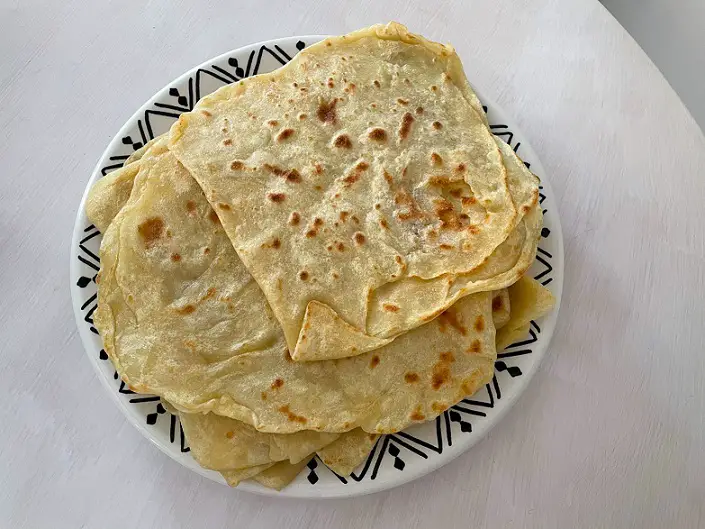
Ftayer - Traditional Tunisian breakfast pastry
Ftayer is one of my favorite Tunisian breakfasts. I would describe Ftayer as a big Tunisian pancake. It’s made of flour, water, dried yeast, a pinch of sugar, and salt. Shaped Ftayers are deep-fried in oil.
In the early morning, pick up freshly fried Ftayer from the bakery. Eat it on its own or with honey or sugar. So so so delicious but at the same time very unhealthy. But totally worth trying!
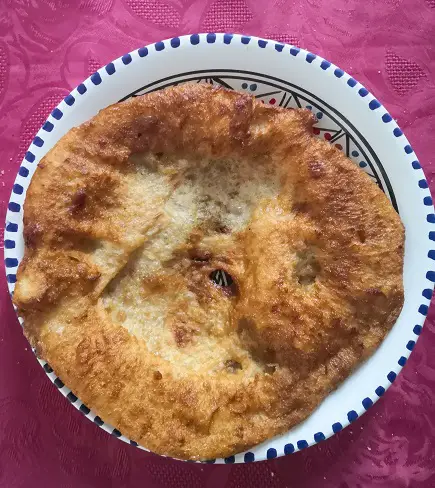
Khchef - The traditional Tunisian breakfast jam
Khchef “confiture coing” is jam or confiture made of quince. Might be that you have never heard of quince fruit. It’s yellow, pear-shaped fruit. It tastes the best when it’s cooked that is why it’s a perfect ingredient for jams and confitures. Raw quince tastes sour and not so good. Khchef is a popular Tunisian confiture that is made of quinces. This jam is perfect with toast or baguette. Try it also with different kinds of cheeses. Very delicious!
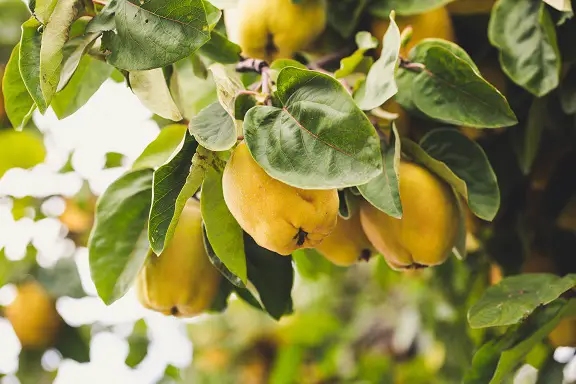
Halwa Chamia
Halwa Chamia is a traditional Tunisian delicacy made of Tahina sesame paste. There are many versions of Chamia: natural one or seasoned with pistachio, almonds, nut mix. In Tunisia, Chamia is a very typical breakfast. Chamia is enjoyed with Mlawi, inside a baguette, or on top of the droo or toast. The flavor of Chamia is sweet but a little bit bitter. It’s very popular among children but also adults.
5 everyday Tunisian breakfast dishes
Croissant (other small pastries)
Eggs
Dates
Olive oil, honey, and ricotta
Sandwich
Above I have presented the very traditional Tunisian breakfast dishes. So, besides the traditional options, what do Tunisians eat as an everyday breakfast? Nowadays, it’s very common for people to pick up some pastry from the bakery. It’s a fast and cheap option. The most common pastries for the breakfast are croissants, pain au chocolat, and butter pastry with a savory filling. Some like to pick up baguette sandwich and enjoy it with freshly squeezed orange juice.
The common breakfast at Tunisian home is a plate of drizzled olive oil and honey. This combination is scooped with a piece of fresh bread. Others like to eat bread with olive oil and ricotta. I must say that freshly made Tunisian ricotta is super delicious! Other typical Tunisian breakfast dishes are sunny-side-up eggs or hardboiled eggs, dates, cereals, and yogurt.
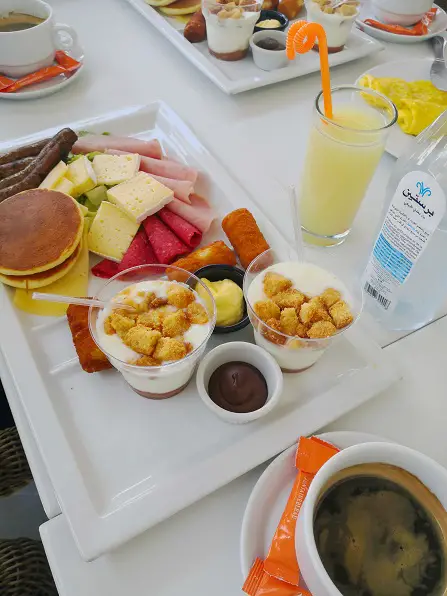
We ate this brunch at famous Frédéric Cassel, Lac 2, Tunis.
What do Tunisians drink in the mornings?
For me, the most important part of breakfast is coffee. Luckily, Tunisia has a really strong café and coffee culture. The most common morning coffee options at the café are espresso, capucin (similar to cappuccino), and direct (similar to café latte). In Tunisian homes, people like to use Moka pot and another option is instant coffee. Tunisians do not drink tea in the morning.
Besides coffee, other typical morning drinks are freshly squeezed orange juice, drinkable yogurt, smoothies, and water. A very traditional Tunisian breakfast drink is Bsissa. The bsissa powder is mixed with ice-cold water and sugar or honey. This drink is full of nutrients, minerals, protein, and fibers.
Rayeb is a traditional drink in Maghreb (Tunisia, Algeria, Morocco) and Egypt. Rayeb is fermented milk that has a flavor of natural yogurt. It’s a very common drink during Ramadan, but it’s also consumed during the weekday mornings.
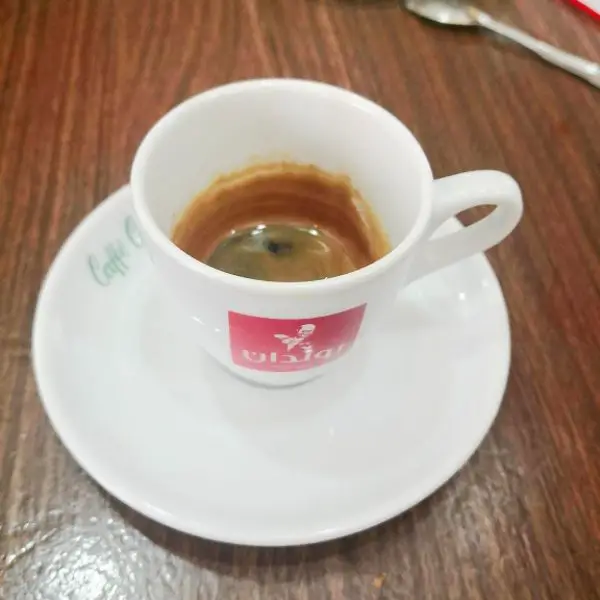
And just like this, the little guide to the traditional Tunisian breakfast has come to the end. As, I mentioned at the beginning Tunisia has really unique breakfast dishes. On your trip, skip the usual waffles or pancakes, and allow yourself to indulge in a truly memorable breakfast experience!
Something more to read:
The most popular Tunisian spices
